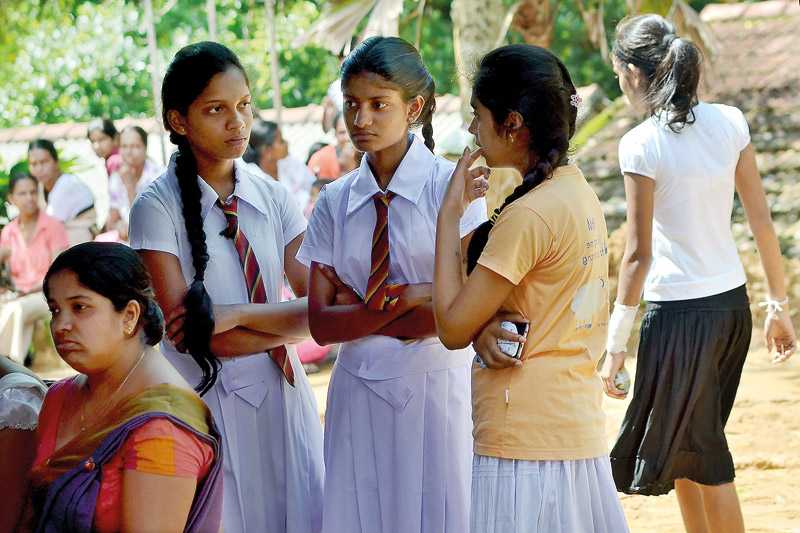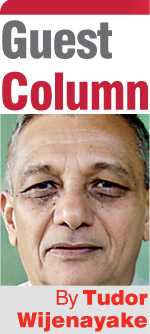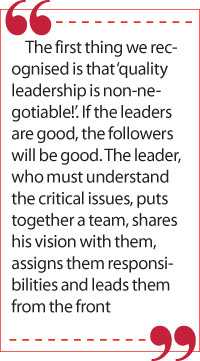Thursday Feb 19, 2026
Thursday Feb 19, 2026
Monday, 17 May 2021 00:00 - - {{hitsCtrl.values.hits}}

For school/university leavers to become employable, the education needs to be converted into English. From beginning of 2022, convert 25% schools to English medium. The schools need to be identified and informed in advance, unwilling teachers would be transferred out and vacancies filled with willing teachers – Pic by Shehan Gunasekara
 The Chairman, National Education Commission (NEC) invited proposals for the ‘Development of National Education Policy Framework’ for 2020-2030. According to the newspaper advertisement dated 12 April, but appeared on 19 April, the Commission requests written proposals for consideration under eight sub-topics i.e. Early Childhood Education, General Education, Higher Education, Technical and Vocational Education, Pirivena Education, Special Education, Non-formal Education and International and Private Schools, under 12 core areas.
The Chairman, National Education Commission (NEC) invited proposals for the ‘Development of National Education Policy Framework’ for 2020-2030. According to the newspaper advertisement dated 12 April, but appeared on 19 April, the Commission requests written proposals for consideration under eight sub-topics i.e. Early Childhood Education, General Education, Higher Education, Technical and Vocational Education, Pirivena Education, Special Education, Non-formal Education and International and Private Schools, under 12 core areas.
The President’s education reforms
Meanwhile, on 26 March, President Gotabaya launched the ‘Digital Platform’ in Temple Trees to solicit public views on proposed education reforms. The President stated that the objectives of the National Policy Framework, is to design and nurture a knowledge-based human capital to suit the 21st century. The President expects the future generation be brought before the world, armed with knowledge and talent through the ‘new education reforms’.
The President also expects suggestions for modernisation and restructuring curricula in universities for job-oriented skills development.
NEC’s previous attempts
National Education Commission in 2016 too presented ‘Proposals for a National Policy on General Education’, also with similar proposals in 1992 and 2003.
The first report of NEC published in 1992, ‘The achievement of National Cohesion, National Integrity and National Unity’ the goal, possibly to overcome racial violence at the time. The report proposed citizens speaking two main languages to promote peaceful living and coexistence.
Accordingly, teaching of second language was initiated in 1999 from Grades 6 to 9, and from 2001 a subject for Grades 10 and 11. The system was expanded in 2003 for Grades 3, 4 and 5, and in 2007 for Grades 1 and 2.
According to 2016 report, “The key guiding principle was that every component of the General Education System should be designed and implemented to serve the educational needs of each Sri Lankan child. By the time a child leaves school he/she should be able and motivated to develop through experiential learning, to be a team member, to share and care, to be tolerant and respectful of the rights of others, sensitive, unbiased, friendly and compassionate; practically and technically skilled in the broadest sense; able to use theory to understand situations, and to think critically, logically, inductively, deductively, analytically and holistically; and be healthy both mentally and physically.”
A lot of glorified words, but nothing practical happened. But the children need to face the world for future employment opportunities, without any preparation.
With this background will the NEC’s new proposals be any better? Thus, the President’s proposals are the only option to face the future.
The President’s dilemma
President Gotabaya is facing a series of problems, the payment of nearly two million Government staff, settlement of massive foreign loans, finding foreign exchange for imports, and forced shutting down due to corona pandemic.
Government staff
During the run-up for presidential elections, Gotabaya promised to employ 50,000 jobless graduates, also 100,000 poor. By then employee numbers had reached 1,800,000. He employed 60,000 graduates. On questioning the President found most have studied Sinhala, Pali and History. With the newly employed 100,000 the total would have reached two million.
In 2001, when Ranil Wickremesinghe became PM, government staff numbered 800,000 and PM declared the numbers were excessive and reduced to 650,000. How did numbers reach 1,800,000 by 2019? Fighting the war needed increased numbers in forces, but not one million. It was the politicians who filled the departments and corporations with their supporters increased the numbers.
Foreign loans and imports
The country’s majority loans were taken after the war, but spent on beautification projects, mostly around Hambantota, failing to bring returns for paying-back. The interest on foreign loans during the last years of MR Government were around 15%. When Yahapalanaya Government received over one million dollars for Hambantota port, the funds were used to settle high interest loans, not project loans.
Today, with reduced exports and no income from tourism due to the corona pandemic, the country faces an extremely serious situation and is forced to cut down imports, even of essential items.
Poor support for the President
The President is fighting a lone battle to raise the country out of the mess, ignored by ministers and public. The sugar scam, which cost the country over Rs. 10 billion, would not have been possible without the support from the finance ministry officials. The proposal to tag alcohol bottles to prevent unauthorised mixing will cost billions in foreign exchange. But what would be the benefit to the country?
The President was forced to seek help from ‘Viyathmaga’, but even their knowledge is questionable. With cancellation of the on-going Elevated Railway Project, the country lost the cordial relationship with Japan that existed for over 70 years. The President’s plan to stop import of chemical fertilisers, without even few pilot projects, would be sure to create countrywide problems. All due to ministers lacking subject knowledge, and unable to digest a relevant article in a newspaper.
Last week SJB members created a commotion in Parliament over alleged moves by CID to arrest MP Harin Fernando. Another MP, Rishad Bathiudeen was in remand over the Easter Sunday attacks. While this happened, opposition leader Sajith Premadasa, was in Yala deep jungles in a Pajero, followed by his security detail, watching a leopard, giving a running commentary, and was highlighted in Sunday Times. How responsible is the Leader of the Opposition?
Let’s look at politicians around the world.
German Chancellor Angela Merkel
Angela Merkel, Germany’s Chancellor, stepped down few weeks ago, after serving the country for 16 years. She is considered responsible for the rise of Germany to the highest position in European Union. She is considered a workaholic and her subordinates claim she is a hard person to please.
Meanwhile, media publicised her personal side, the facts obtained at multiple occasions when she answered questions from the media. She is a simple lady, lived with her husband in the same apartment she occupied prior to her election. She had no servants and the couple divided the household chores between them. She informed, they washed their cloths at night, when the electricity demand is low. She has claimed not to own wealth, yachts or palaces. When a reporter questioned why she wore the same dress every day, she replied, “I am only a government servant and not a model”.
How many of even our Pradeseeya Sabha members claim such a lifestyle?
Israel vaccinates the entire country
According to BBC, in early April, Israel became the first country to inoculate its entire population over 18 against the coronavirus. All schools and universities were opened and mask requirements were removed.
Israel’s leaders are well-educated, many with advanced degrees. Their PM, Benjamin Netanyahu with Masters from Massachusetts Institute of Technology (MIT), started (but didn’t finish) a PhD at Harvard.
They realised that the only way to beat the pandemic was by vaccination of the entire community. They selected two companies leading in vaccine development, Pfizer and Moderna. The Israeli PM immediately developed a personal friendship with the CEOs of both companies (using his Harvard and MIT connections).
Immediately Pfizer announced successful Phase 3 trials, Israel arranged with Pfizer to collect their first 8 million doses for twice the price ($ 30 per dose), at Pfizer’s expected selling price. By November 2020, Israel had acquired the vaccines required to immunise its people.
Israeli PM was asked of payment of $ 15 per dose extra, his response was classic 2nd order thinking. Under pure economic numbers, the overpaid amount was less than three days lockdown cost of the country. Without counting the extra medical costs of COVID and the incalculable price of losing a loved one.
This is how smart and educated leaders think and achieve for their country.
 Lee Kuan Yew’s open letter to Malaysian leaders
Lee Kuan Yew’s open letter to Malaysian leaders
Extracts from a letter circulating in social media, supposed to be from Lee Kuan Yew’s grave to Malaysian leaders:
Singapore, became a member of Malaysia in 1963, as they thought it was impossible to survive on their own, but were expelled from the Union in 1965. The country was without natural resources, even potable water was imported. No oil, no gold, no solid minerals, nothing. All they had were human beings and ports.
Dear Malaysian leaders, we did not give up. We resolved to turn our fortunes around. Today, we are one of the four Asian Tigers, so-called because of our incredible development story. We are no longer a Third World country. Singapore is the only Asian country with the top AAA rating by all credit rating agencies. We are the fourth largest financial centre in the world. We have one of the five busiest ports in the world.
We are among the top three oil-refining centres in the world, with world’s biggest refineries, yet we don’t have oil! Meanwhile, Malaysia, with all the oil you produce, has been importing petrol, diesel, kerosene, engine oil and other petroleum products for decades.
Let me shock you: “We are the largest oil-rig producers in the world! World Bank ranks us as the easiest place to do business in the world. I’m blushing, even in death!”
The first thing we recognised is that ‘quality leadership is non-negotiable!’. If the leaders are good, the followers will be good. The leader, who must understand the critical issues, puts together a team, shares his vision with them, assigns them responsibilities and leads them from the front.
Extracts from Singapore PM’s book ‘From Third World to First’ with respect to his trip to Ottawa, Canada, for the Commonwealth meeting in 1973:
When I landed, I saw a parked Boeing 707 with ‘Bangladesh’ emblazoned on it. Bangladeshi Prime Minister, Sheikh Mujibur Rahman, had arrived in his own aircraft. When I left, it was still standing on the same spot, idle for eight days, without earning anything. Presidents of Kenya and Nigeria too have arrived in jets.
I made a virtue of arriving by ordinary commercial aircraft and thus helped preserve Singapore’s Third World status for many years. Our permanent representative at the UN explained that poorer the country, the bigger the Cadillacs they hired for their leaders.
Our own past leaders
Our leaders did better. Nearly a decade ago, our President visited US for a conference, the plane loaded with politicians, friends and henchmen numbering over 200. The plane stayed on the tarmac for over a week, while passengers were accommodated in most expensive hotels. While the President took part in the Conference, visitors travelled the US. All their costs were borne by the citizens.
On a latter day in London, President MR wished to cancel paid first-class passengers for their travel in Air Lanka flight to Colombo, to accommodate Ministers who were with him. The incident led to ending the contract signed with Emirates.
Indian vaccine production
World’s largest vaccine producer AstraZeneca, produced same in India as Covishield, with a production capacity of 70 million vaccines a month. But by February 2021, with low COVID-19 infections in India, confirmed orders were only 21 million, was forced to reduce production. But today they are blamed for vaccine shortage.
On 25 February, Sri Lanka received 500,000 doses of Covishield vaccines, a gift from the Indian Government, and also purchased further 500,000 doses. If our Health Ministry officials signed an agreement to purchase further stocks, we would have got our entire requirement of vaccines. Did our officials check the world-wide vaccine situation over the internet?
Expensive politicians
Our big-mouthed politicians are among the most uneducated in the world, nearly 100 without even OL. When a newspaper group requested the parliament staff for qualifications of politicians, the request was turned down claiming invading personal privacy. But for their inability to understand the country’s problems and possible solutions, public pays the penalty.
The new education policy
The President expects with education reforms the future generation will be armed with knowledge and talent. Also, universities will be modernised and curricula restructured including IT knowledge for job-oriented skill development.
But the question forwarded by the NEC indicates that they are ignorant of modernisation of education towards employment. Possibly due to their own poor education without knowledge of the outside world.
Meanwhile, our students who got accustomed to online and IT due to corona-affected education would be eager to move towards a digital platform as proposed by the President.
Current higher education
Currently there are 20 government universities and 23 privately owned degree-awarding institutions. State universities offer a limited number of courses and expect government jobs, which the country cannot afford. Meanwhile, private universities offer an astonishing array of courses, involving few years in Sri Lanka and balance abroad.
Students from private schools enter local universities or go abroad for further education, all charging fees. Even today, Harvard University absorbs one student from Sri Lanka each year, selected from private international schools, based on performance at international examinations. Their objective being, Harvard students need to have friends in every country for future business needs.
Practical problems
The teaching of Tamil to Sinhala students and vice versa attempted since 1999 was a failure. However, few schools offer some subjects to students in English medium, referred to as bilingual education. But teachers are a problem. In most cases, owing to lack of qualified teachers, schools assign English language teachers to teach subjects such as Geography, Science, etc.
The NEC Report under ‘Contradictory Performance of Students in Bilingual Education’ says: “It appears that students in bilingual classes have increased their language competencies in English. They perform well in examinations in English medium subjects. But they do not use English in everyday speech. Thus, it appears that they have developed reading and writing skills only.”
Educated politicians
Education standards for politicians will never be consented by the parliament. Only way is from next election, public should demand to publicise each contestant’s education details through a campaign over Facebook, forcing dropping of uneducated persons prior to nominations. Also, some existing politicians who have obtained their qualification by undue means, need be brought to light.
The public should demand minimum qualification of a minister and their IT capabilities, prior to being appointed. It is never too late for learning. Lee Kuan Yew studied for a Doctorate from Harvard online while being the Prime Minister.
Possible way forward
For school/university leavers to become employable, the education needs to be converted into English. From beginning of 2022, convert 25% schools to English medium. The schools need to be identified and informed in advance, unwilling teachers would be transferred out and vacancies filled with willing teachers. When the program is announced, tuition classes would appear overnight. The Department could pay a sum as tuition fees.
With the conversion, initially, language proficiency would be poor, but as proven earlier, students and the proficiency would improve.
Private universities offer a vast array of courses as management, finance, marketing, etc., enabling employment in private sector, and can be followed by arts students too, but a knowledge of English is essential. Government should stop employing jobless graduates, who should instead be directed to follow courses in private universities leading to jobs in private sector, with Government paying course fees and a living allowance during the course period.
An example for universities to follow is SLIIT, an independent not-for-profit organisation, offering a wide range of courses. In 2019/2020, the Institute created history by disbursing over Rs. 64 million in scholarships to students.
A silver lining over the horizon. When Port City becomes operational, it would attract educated locals currently employed abroad. In addition, companies with offices in Port City, would demand outsourced IT, and financial services, employing thousands. Thus, transferring our education to English medium and multiple skills from universities are urgent. Private universities have already moved in this direction.